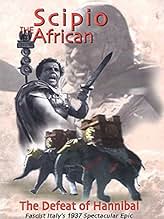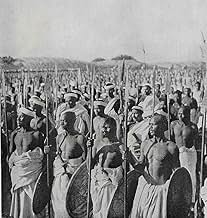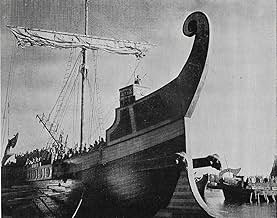PUNTUACIÓN EN IMDb
5,3/10
329
TU PUNTUACIÓN
Añade un argumento en tu idiomaA story of the Second Punic Wars, beginning with Scipio's futile pleas to the Roman Senate to build an army to battle Hannibal, that climaxes with the battle of Zama.A story of the Second Punic Wars, beginning with Scipio's futile pleas to the Roman Senate to build an army to battle Hannibal, that climaxes with the battle of Zama.A story of the Second Punic Wars, beginning with Scipio's futile pleas to the Roman Senate to build an army to battle Hannibal, that climaxes with the battle of Zama.
- Premios
- 1 premio en total
Argumento
¿Sabías que...?
- CuriosidadesOne of the earliest known uses of the zoom lens.
- PifiasExtras wearing wristwatches, even though the film is set thousands of years before they were invented.
- ConexionesEdited into La case du siècle: Cinecittà, de Mussolini à la Dolce Vita (2021)
Reseña destacada
In 202 BC Publius Scipio inflicted a devastating defeat on Hannibal at Zama. This triumph has been used in this flagrantly propogandist film to justify Mussolini's invasion of Abyssinia. This expensively made 'epic' was not a success and we can safely assume that its influence on the average Italian cinema-goer was minimal.
Despite its jingoistic speeches and upraised Roman salutes this film, purely as a film, should not be entirely dismissed as there are some very effective scenes with marvellous images captured by cinematographers Ubaldo Urata and Anchise Brizzi. The score is by Ildebrando Pizzetti who contributed to the original score for Pastrone's 'Cabiria' in 1914!
Director Carmine Gallone's film career stretched from 1913 to 1962 and he keeps the momentum going here with powerful crowd scenes and some intimate dialogues involving Hannibal, Velia and Sophonisba. In fact Gallone's best directed scenes feature the tantalising Francesca Braggiotti as Sophonisba. This actress did very few films and when her husband John Lodge did the acting profession a great service by going into politics she became the First Lady of Connecticut. Our loss. Velia as played by luscious Isa Miranda is nobility incarnate and defiantly declares to Hannibal: 'Romans fear only the Gods'. If the character of Scipio is meant to mirror that of Il Duce it is very much an 'own goal' as the actor Annibale Ninchi is totally devoid of charisma. Ironically it is the character of Hannibal as played by Camillo Pilotti who is by far the most interesting and sympathetic. This cannot have been intentional surely?!
The last fifteen minutes is devoted to the Battle of Zama which depicts the gruesome brutality of hand-to-hand combat. The battle opens with the charge of Hannibal's trumpeting elephants. Should any animal rights activists be watching I would strongly recommend they take an opportunity at this point to make a cup of tea. As one critic has cleverly observed: 'What Scipio did to the elephants, Mussolini was to do to Italy!
Despite its jingoistic speeches and upraised Roman salutes this film, purely as a film, should not be entirely dismissed as there are some very effective scenes with marvellous images captured by cinematographers Ubaldo Urata and Anchise Brizzi. The score is by Ildebrando Pizzetti who contributed to the original score for Pastrone's 'Cabiria' in 1914!
Director Carmine Gallone's film career stretched from 1913 to 1962 and he keeps the momentum going here with powerful crowd scenes and some intimate dialogues involving Hannibal, Velia and Sophonisba. In fact Gallone's best directed scenes feature the tantalising Francesca Braggiotti as Sophonisba. This actress did very few films and when her husband John Lodge did the acting profession a great service by going into politics she became the First Lady of Connecticut. Our loss. Velia as played by luscious Isa Miranda is nobility incarnate and defiantly declares to Hannibal: 'Romans fear only the Gods'. If the character of Scipio is meant to mirror that of Il Duce it is very much an 'own goal' as the actor Annibale Ninchi is totally devoid of charisma. Ironically it is the character of Hannibal as played by Camillo Pilotti who is by far the most interesting and sympathetic. This cannot have been intentional surely?!
The last fifteen minutes is devoted to the Battle of Zama which depicts the gruesome brutality of hand-to-hand combat. The battle opens with the charge of Hannibal's trumpeting elephants. Should any animal rights activists be watching I would strongly recommend they take an opportunity at this point to make a cup of tea. As one critic has cleverly observed: 'What Scipio did to the elephants, Mussolini was to do to Italy!
- brogmiller
- 2 jun 2020
- Enlace permanente
Selecciones populares
Inicia sesión para calificar y añadir a tu lista para recibir recomendaciones personalizadas
Detalles
- Fecha de lanzamiento
- País de origen
- Idioma
- Títulos en diferentes países
- Scipio Africanus: The Defeat of Hannibal
- Localizaciones del rodaje
- Empresas productoras
- Ver más compañías en los créditos en IMDbPro
- Duración1 hora 57 minutos
- Color
- Mezcla de sonido
- Relación de aspecto
- 1.37 : 1
Contribuir a esta página
Sugerir un cambio o añadir el contenido que falta

Principal laguna de datos
By what name was Escipión, el africano (1937) officially released in Canada in English?
Responde




























